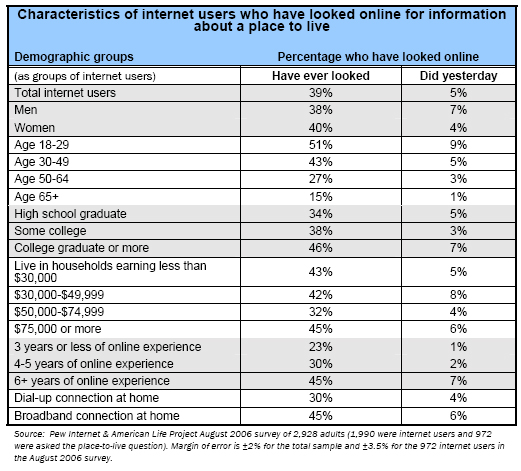39% of internet users have looked online for information about a place to live – double the overall number of Americans who had done so in 2000
The number of internet users who go online to look for information about a place to live has grown steadily over the past six years. Now, nearly two in five adult internet users in the U.S. (39%) have done this, up from 34% in 2004 and 27% in 2000.
This means that overall, more than a quarter of all adults in the U.S. (27%) have looked online for information about housing, more than double the overall number of Americans who had done so in 2000 (13%).
Also, more than half (51%) of the youngest adult American internet users, 18 to 29 years old, have searched online for housing information. This compares with 43% of internet users 30 to 49 years old; 27% of internet users age 50 to 64; and 15% of internet users age 65 and older.
Perhaps reflecting their transient stage of life as well as their remarkably intensive use of the internet, 9% of online Americans ages 18 to 29 reported in August that they looked for housing information on a typical day, more than double the percentage (4%) in this age group who said the same thing two years earlier.
Two other characteristics of internet users are associated with the likelihood of looking online for information about places to live: the number of years they have been internet users and the type of internet connection they have at home. Those who have been online six years or more are significantly more likely than shorter-time users to have done this: 45% of these veteran users have looked online for housing information; compared with 30% of those who have been online 4-5 years; 24% of those online for 2-3 years; and 22% of those online one year or less. In addition, 45% of those with broadband connections at home have looked online for housing information, compared with 30% of those with home dial-up connections.
Among the factors related to the likelihood of looking online for a place to live, youth is a stronger predictor than connection speed or years of online experience.

More perspectives on looking online for information about a place to live
Another perspective on this online activity comes from those who have actually found a new place to live. In another survey conducted early in 2005 by the Pew Internet & American Life Project, we asked internet users who had found a new place to live during the preceding two years whether the internet had played a role in making that change in their lives. The results were split: one half of them said the internet had played a role, the other half said it had not. Of those who said yes, one third said the internet had played a crucial role, another third said it played an important role, and the final third said it played a minor role.
This was an increase from three years earlier, when among a like group of respondents, 62% said internet played no role. Of the 38% who said the internet did play a role, 9% said it played a crucial role; 13% an important role; and 16% a minor role.
More evidence of popularity and more resources for looking online for a place to live
Independent data from the National Association of Realtors (NAR) supports the popularity of internet use in looking for housing information online. The NAR reported that over three-quarters of home buyers (77%) in 2005 had used the internet to help in their home search.1
Internet users who are looking for housing information have a vast and growing menu of resources at their fingertips. Much more specific housing information is readily available online than before, including access to Multiple Listing Services, which were formerly in the private domain of realtors, as well as new searchable housing databases, and even housing information on blogs2. Also, layers of cross-referencing applications can help real-estate searchers flesh out their searches with maps, links to community information, monthly mortgage calculation tools, and links to virtual tours or photographs.
Two related data points from our own surveys show that users increasingly make use of internet offerings that might be housing-related: by August 2006, about half of all internet users (51%) have taken virtual tours, up from 45% in November 2004. Also, nearly one third of all internet users (30%) have used online classified ads or sites such as Craigslist, up from 22% in September 2005.
About the Pew Internet & American Life Project
The Pew Internet Project is a non-partisan, non-profit research center that examines the social impact of the internet. It is part of the Pew Research Center and is funded by the Pew Charitable Trusts.


